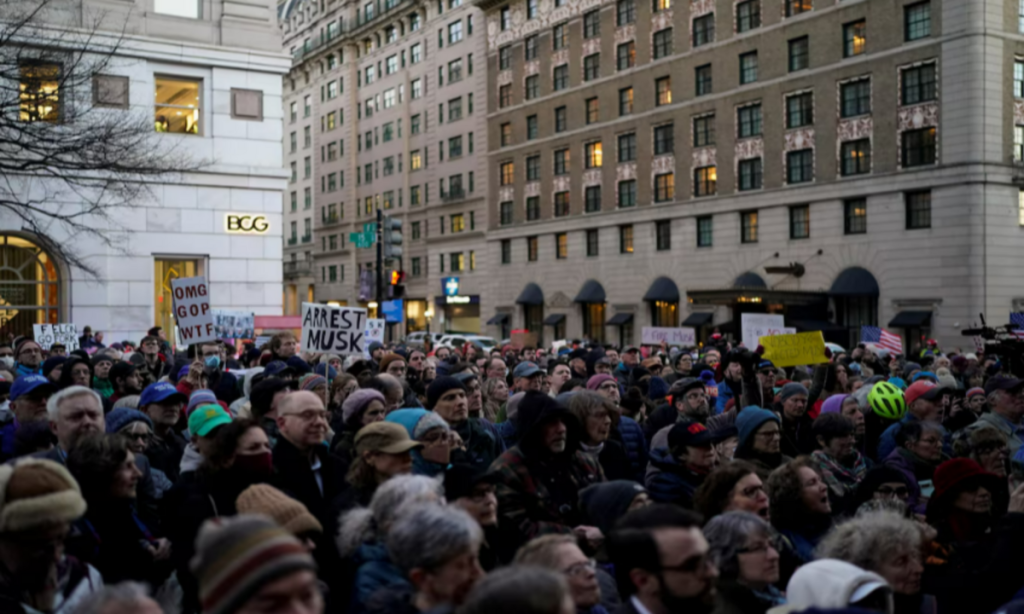WASHINGTON, D.C. — Growing concerns have emerged among retirees and federal workers regarding the Department of Government Efficiency (DOGE), led by Elon Musk, and its expanded access to sensitive government data.
Many fear that DOGE’s actions could jeopardize Social Security benefits and expose personal information, raising serious privacy and financial security concerns.
Background of the Issue
DOGE was established under President Donald Trump’s administration with the stated goal of eliminating wasteful government spending and improving efficiency. However, its recent moves have sparked controversy. On January 31, 2025, reports surfaced that David Lebryk, a senior Treasury Department official, was removed from his position after refusing to grant DOGE access to a crucial system responsible for disbursing over $5 trillion annually, including Social Security benefits and tax refunds. Following his removal, Treasury Secretary Scott Bessent granted DOGE access to the system, escalating concerns among lawmakers and advocacy groups.
This unprecedented level of access has alarmed many, especially retirees and federal employees who rely on these benefits for financial stability. Critics argue that such a move could undermine the integrity of the Social Security Administration and potentially disrupt payments to millions of Americans.
Legal Actions and Public Outcry
In response, multiple organizations, including the American Federation of Teachers and the National Active and Retired Federal Employees Association, have filed a lawsuit against the Treasury, Education Department, and Office of Personnel Management. The lawsuit alleges that these agencies violated the Privacy Act of 1974 by improperly sharing sensitive personal data with DOGE.
On February 8, 2025, a federal judge issued a preliminary injunction, blocking DOGE from accessing Treasury Department records containing personal data such as Social Security numbers and bank account information. The judge also mandated the destruction of any records that DOGE had unlawfully obtained.
Protests and Political Reactions
The legal battle has sparked widespread protests. On February 10, approximately 150 public officials, retirees, and federal workers gathered outside the Social Security Administration headquarters in Woodlawn, Maryland, to voice their concerns. Protesters held signs reading “Hands Off Our Social Security” and “Nobody Elected Elon Musk,” reflecting their anger and frustration.
Shelley Washington, a 35-year veteran of the Social Security Administration, expressed his concerns about the potential collapse of the system. “I’ve spent my entire career making sure that retirees get their checks on time. Now, I fear we are heading toward chaos,” Washington stated.
Former Maryland Governor Martin O’Malley also criticized DOGE’s actions, alleging that its true intent was to misuse personal data and undermine public trust. Senator Chris Van Hollen referred to the situation as “a recipe for corruption,” while U.S. Representative Angela Alsobrooks called it part of Trump’s “wicked hunt for vengeance.”
DOGE’s Justification and Musk’s Claims
Musk and DOGE maintain that their objective is to identify and eliminate fraudulent payments. In a recent post on X (formerly Twitter), Musk claimed that between $50 billion and $100 billion in fraudulent entitlement payments occur annually, though he did not provide verifiable sources for these figures. “If accurate, this is extremely suspicious,” Musk wrote.
Despite these assertions, many remain unconvinced. Critics argue that DOGE’s actions threaten to destabilize an already strained system, leading to potential delays in payments or exposure of sensitive personal information.
What Happens Next?
The federal judge’s injunction is only a temporary measure, and the legal battle is expected to continue in the coming months. Lawmakers and advocacy groups are pushing for stronger protections against unauthorized access to federal data. Meanwhile, retirees and federal employees remain on high alert, worried about the potential long-term consequences of DOGE’s involvement in government operations.
As the controversy unfolds, one thing remains clear: the debate over government efficiency versus the protection of personal data is far from over. Whether DOGE’s actions lead to genuine reforms or spark further legal challenges, millions of Americans will be watching closely to see what happens next.
Disclaimer—Our team has checked this article to ensure its accuracy and eliminate any misinformation. We are committed to providing clear and reliable information for our readers.


